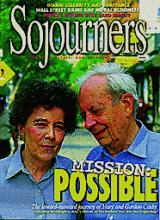In the 15th chapter of the gospel of John, Jesus attempts to prepare his earliest disciples for their future. Knowing that he will soon be leaving them, Jesus instructs his disciples on what it will mean for them to be an authentic faith community into their future.
The Church of the Saviour is moving into a new millennium. How have we been prepared to be authentic into that new millennium? What have we learned from the Church of the Saviour's 50-year history, rooted in our much longer biblical history, that is essential to our being faithful into our future? I'd like to name four areas in which I think we have been prepared to move toward deeper faithfulness, if we choose to do so.
The first is in the area of being authentic community. Gordon and Mary Cosby have given the last 50 years of their lives to building church, to nurturing authentic communities of faith. People come from all over the world to visit the various ministries that have grown out of these authentic faith communities over the years.
People come to see Jubilee Housing, Samaritan Inns, Christ House, Joseph's House, Good Shepherd, Columbia Road Health Services, the Servant Leadership School, and all of the rest that are the fruit of authentic communities of faith. These are the fruit of branches deeply connected to the vine.
Having experienced such fruitfulness, the temptation is to invest all of our time and energy into maintaining and nurturing the fruit and, in so doing, neglect the source of the fruit's lifeneglect nurturing a deep connection to the vine. Jesus doesn't mince words concerning the fate of branches that become disconnected from the vine. They wither. They lose eternal value. They become dead wood for the fire.
Read the Full Article

